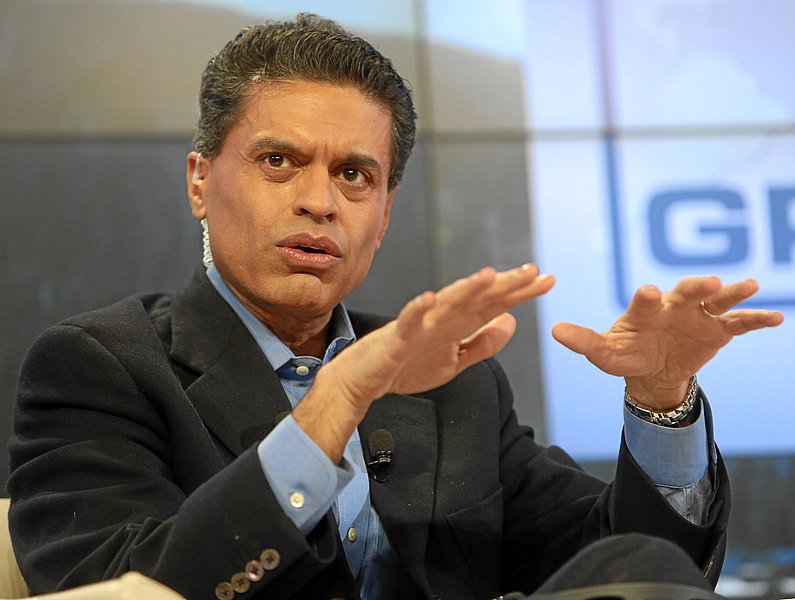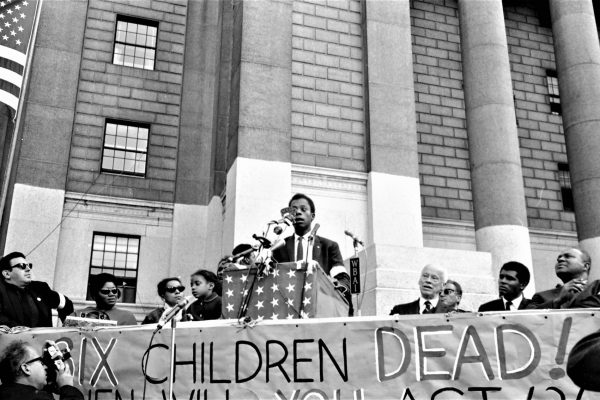Fareed Zakaria—host of CNN’s Fareed Zakaria GPS, editor-at-large for TIME, and columnist for the Washington Post—was recently implicated in a plagiarism scandal. Conservative media watchdog Newsbusters found that portions of a TIME article he wrote on gun control were borrowed without attribution from a New Yorker article by Jill Lepore. Zakaria apologized for his error, explaining that he had confused his handwritten notes. His publishers each suspended him for a month, but TIME and CNN rescinded their bans after only a week, once their investigations found no additional problems.
Plagiarism is a serious ethical breach. At Yale University—where Zakaria matriculated and was, until recently, a trustee—plagiarists can be expelled. Last month, Zakaria resigned from Yale’s board shortly after the scandal, saying he wanted to “focus on the core of my work.”
However, there is another issue of journalistic ethics that should concern Zakaria’s critics: “buckraking”—accepting large fees for speaking engagements from industry interests he covers. Zakaria is one of many celebrity speakers represented by the Royce Carlton broker agency. His booking fee is proprietary information that Carlton Sedgeley, the agency’s president, refused to disclose to me. However, one person who tried to book Zakaria in 2008 for a speaking engagement was quoted a price of $75,000 for a one-hour talk, according to journalist Ken Silverstein.
Such lucrative compensation has led some critics to wonder whether journalists should be permitted to accept speaking engagements from industry interests they cover. In a Columbia Journalism Review article on the subject, Paul Starobin questioned Zakaria’s coverage of financial issues while accepting speaking engagements from, among other firms, Baker Capital, Catterton Partners, Driehaus Capital Management, ING, Merrill Lynch, Oak Investment Partners, Charles Schwab, and T. Rowe Price. Until recently, one could have seen a list on the Royce Carlton Web site of the firms that hired Zakaria and recommended him, but that list has been scrubbed and is in the process of being revised. (Compare the current list with the previous one in the documents at the end of this article.)
“People have been using it incorrectly, so we’ve taken [the recommendations] down,” said Sedgeley, who claimed there was at least one error on it. “It’s not a definitive list.” Only one recommendation—from Stanford University—is currently displayed.
Presumably collecting large speaking fees from financial companies while covering the industry as a beat reporter for the Wall Street Journal is problematic. But Zakaria isn’t a business journalist. He is a pundit who comments on all and sundry, but with a special focus on foreign affairs and national security. Though Starobin notes that Zakaria has commented on Occupy Wall Street and the European financial crisis, he offers no examples of commentary rendered questionable because of his speaking engagements. Moreover, many of his lectures are for universities and nonprofit foundations that represent a wide variety of people and interests, which makes the accusation more difficult to substantiate. We must delve more deeply into the Zakaria problem.
• • •
This past March, Zakaria penned a Post column on how American energy security may benefit from shale gas—natural gas trapped within shale rock formations. Shale gas is abundant in many U.S. states and can be extracted through the application of highly pressurized fluids. This process, known as hydraulic fracturing or “fracking,” is controversial for its alleged environmental hazards. It uses a lot of water and nasty chemicals; releases methane, a potent global-warming gas; generates residues that can leech into groundwater and poison wells; and may, some seismologists worry, cause earthquakes.
Despite such concerns, Zakaria’s piece offers a strikingly optimistic endorsement, especially of shale gas’s implications for our energy security and for international politics. Since the United States has shale deposits in abundance, the threat of rising oil prices to our domestic economy, due in part to instability in the Middle East, can be reduced. And since shale gas deposits are widely dispersed globally, they provide the world leverage against menacing oil-producing nations such as Russia and Iran.
“The rise of shale gas is shaping up to be the biggest shift in energy in generations,” Zakaria concludes. “And its consequences—economic and political—are profoundly beneficial to the United States.”
Zakaria has continued endorsing shale gas on his CNN show and blog, calling the energy source a positive “game-changer” for the United States and global politics.
When he turns to consider the principal drawback of shale gas—the environmental dangers of fracking—his responses are cursory and one-sided. It is, after all, the chief hurdle for his argument that shale gas is, all things considered, worth pursuing.
In his Post op-ed, Zakaria writes,
The environmental concerns are well taken. But the best studies out now—such as one by a committee that included the head of the Environmental Defense Fund—suggest that fracking can be done in a safe and responsible manner.
The “study” to which he alludes is not an environmental-impact study by scientists, the Environmental Protection Agency, or the EDF. It is, rather, a final report [PDF] of the Shale Gas Production Subcommittee of the Secretary of Energy Advisory Board. The purpose of the report is to recommend “measures that can be taken to reduce the environmental impact and to help assure the safety of shale gas production.” However, the report also sounds alarms about the substantial burdens for safe drilling and how the government and industry aren’t taking the necessary steps to fulfill them.
The question is whether Zakaria’s conclusions are based on careful and independent consideration of the issues.
The subcommittee repeats this warning in several places, pointing out that it recommends action on fracking because
absent action, there will be little credible progress toward reducing the environmental impact of shale gas production, placing at risk the future of the enormous potential benefits of this domestic energy resource.
The conclusion of the report says,
The Subcommittee believes that if action is not taken to reduce the environmental impact accompanying the very considerable expansion of shale gas production expected across the country—perhaps as many as 100,000 wells over the next several decades—there is a real risk of serious environmental consequences causing a loss of public confidence that could delay or stop this activity. . . .
The Subcommittee has the impression that its initial report stimulated interest in taking action to reduce the environmental impact of shale gas production by the administration, state governments, industry, and public interest groups. However, the progress to date is less than the Subcommittee hoped and it is not clear how to catalyze action at a time when everyone’s attention is focused on economic issues, the press of daily business, and an upcoming election.
Zakaria’s column does not register these concerns.
His CNN broadcast is even more superficial. When he turns to the environmental objections to fracking, he says: “One problem—there’s a significant lobby against shale gas and the way it’s produced.” To label the environmental problem a “lobby” suggests that the worry isn’t about whether fracking threatens significant environmental harm, but rather about the ability of the opposing side—his side—to win public opinion.
Zakaria then refers to a report from the International Energy Agency, “Golden Rules for a Golden Age of Gas,” which shows that, if participating nations follow a set of best practices, the risks from fracking become “manageable.” He concludes by repeating that same key word, “manageable”:
Let’s figure out how to make fracking cleaner and safer. We can regulate the process with good, simple rules. The benefits are immense and the problems manageable.
Shale-gas skeptics are not simply expressing concerns about whether the environmental dangers are manageable under a set of best practices, but about whether the dangers will, in fact, be managed responsibly, given the ways industry often maximizes profits at the expense of best practices and government regulators fail to do their jobs or become captured by the industries they oversee.
To be fair to Zakaria and to columnists and television hosts everywhere, it is very difficult to dig deeply into an issue in a short column or television segment. The more important question is whether Zakaria’s conclusions are based on careful and independent consideration of the issues. The public’s confidence in his endorsement of shale gas would be shaken much more by the revelation that he has accepted significant speaking fees from people and organizations with stakes in shale gas.
• • •
In the nationwide shale-gas craze, three regions are especially booming: West Texas, Western Pennsylvania, and Oklahoma. Zakaria has attended speaking engagements in all three, thanks to the money and hospitality of people and companies with financial stakes in shale gas.
Last April, Zakaria traveled to West Texas as the guest speaker of the Davidson Distinguished Lecture Series hosted at Midland College. Midland and Odessa are thriving, thanks to shale gas prospects in Texas’s Permian basin. Among other topics, Zakaria spoke about “the future of energy” and discussed “how shale gas is a crucial energy component.”
A co-sponsor of Zakaria’s talk and host of the post-lecture party was Harris E. Kerr, a local oil, gas, and real-estate lawyer. A vocal proponent of domestic drilling, Kerr paid for an advertisement in the Midland Reporter-Telegram that took the form of an op-ed arguing for the importance of Midland’s oil and gas industry for the U.S. economy and energy security.
Do Zakaria’s speaking engagements generate a conflict of interest for his endorsement of shale gas?
Kerr heads Permian Abstract Company, which maintains land ownership records for area oil and gas properties. The shale-gas craze has led to a real-estate boom in West Texas, as landowners seek to cash in on mineral rights. (He seems to have tried to launch a natural gas company, Andrews Consolidated, judging from records with the Texas Secretary of State. The company was dissolved in 1998.)
Other sponsors of the talk included oil and gas businessmen Frank Cahoon and Jim Woodcock, and petroleum engineer Jayne Krawietz. Kerr, Krawietz, and Woodcock were photographed with Zakaria at Kerr’s post-lecture reception.
Zakaria was also the headline speaker at the October 2009 conference of the Pittsburgh Middle East Institute (now called American Middle East Institute), a nonprofit dedicated to building business, educational, and cultural relationships between the Pittsburgh region and the Middle East.
“We do a lot of different things, but we are really leading with a business focus, of providing a forum for businesses to learn about the Middle East and to also allow these delegations from the Middle East to learn about Pittsburgh,” said Simin Curtis, PMEI’s president, CEO, and founder. Area companies involved in the shale-gas industry, such as EQT Corporation, Range Resources, and Universal Well Services, credit Curtis and PMEI for opening doors with the Sultanate of Oman and its state-owned oil company.
The Oman Oil Company is, in fact, an affiliate of the institute. The special guests to the 2009 event at which Zakaria spoke were an Omani delegation that included several government officials in the country’s energy and engineering sectors. Oman’s oil and gas ministry is keen for foreign investment in its shale-gas deposits.
Four of the six major sponsors [PDF] of the 2009 conference, entitled “Pittsburgh and the Middle East: Forging Partnerships in Energy Sustainability and Green Technologies,” were EQT, CONSOL Energy, dck worldwide, and NOVA Chemicals—all of which have significant financial interests in shale gas. The corporate host committee for the event was chaired by Massy Paul, President of Monaloh Basin Engineers, a company heavily involved in the Marcellus shale-gas bonanza.
Last May Zakaria also visited Tulsa to deliver the keynote address at the awards banquet for the Oklahoma Foundation for Excellence, a nonprofit that supports public education. The patrons and sponsors of the foundation include Chesapeake Energy, ConocoPhillips, Devon Energy Corporation, ONEOK Inc., and OGE Energy Corporation—all of whom have major stakes in shale gas. The Foundation’s spokesperson refused to disclose the terms of their agreement with Zakaria but said that the Foundation’s founder and chairman, David L. Boren, was behind the selection.
A former senator and governor of the Sooner state, Boren is president of the University of Oklahoma. In April 2009 and November 2010, Zakaria visited Norman to speak at dinners for OU President’s Associates, a club of donors to Boren’s major initiatives. The two men are mutual admirers and have known each other ever since Zakaria, a 19-year-old undergrad at Yale, brought a delegation of fellow students to visit Boren, an alumnus, in Congress. For doing the two events Zakaria was paid an undisclosed amount from private funds, said Catherine Bishop, Vice President for Public Affairs. On August 15, I made a request at the university’s open records office to release more information, but the request has not been fulfilled.
Boren has a significant interest in the future of shale gas. As reported in The New York Times, Boren is a board member of Continental Resources, an Oklahoma-based oil and gas company with large investments in shale projects. He received $350,000 in total compensation from Continental last year, and has sold more than $600,000 of his stock in the past two years. He has also been on the boards of shale-gas players ConocoPhillips, Hiland Partners GP LLC, and Hiland Partners LP. Two of his largest, multi-million-dollar university donors are Harold Hamm, head of Continental Resources and chairman of Hiland Partners, and Aubrey McClendon, CEO of Chesapeake Energy.
• • •
What should we make of these speaking engagements? Do they generate a conflict of interest for his endorsement of shale gas on CNN and in the Washington Post?
My repeated attempts to put that question to Zakaria himself went unanswered. However, CNN issued the following response to my queries:
We have full confidence in Fareed Zakaria and do not think his outside speaking appearances interfere with his CNN responsibilities on his weekly show or his commentary on CNN. For two decades now he has a well-deserved reputation for reaching his conclusions in an independent and fair-minded manner. We are aware of and review all of his speaking engagements.
Fred Hiatt, the Washington Post’s editoral page editor, said this in response:
The Post does have a policy on outside speaking that applies to staff writers. For non-staff contributors, our expectation is that they will exercise sound judgment and inform readers of anything that a reasonable person might consider a relevant conflict. In Fareed’s case, I know that CNN, his primary employer, vets his speaking engagements. I have confidence in his judgment. And I find your examples not to fall into a category that I would expect to be disclosed to readers. The idea that Fareed, in accepting an offer to speak at a non-profit institution such as the University of Oklahoma, should be expected to inquire into the private holdings of the university’s president strikes me as far-fetched and unpersuasive.
Here we must be careful. Hiatt is certainly right that the examples don’t offer standard fare for conflict-of-interest charges. They aren’t shale-gas companies but nonprofit organizations that are led by or have connections to people with shale-gas interests. Thus the standard rules for such issues—such as public disclosure—may not apply. But that does not mean these examples aren’t problematic.
Should we trust those who are not just journalists but thought leaders and brands?
To be clear, the allegation is not that there is a quid pro quo between Zakaria and those who invite him to speak. Nor is it the claim that if he accepts speaking fees from shale-gas interests, his support of shale gas is due to the fees. Nor is it even the claim of a straightforward conflict of interest, since we do not know for certain whether Zakaria knew the financial interests of the people who invited and paid him to speak at these nonprofit institutions.
It is useful to compare the alleged corruption of Congress by moneyed interests. According to legal scholar Lawrence Lessig’s analysis in Republic Lost (2011), the problem with the massive amount of fundraising and lobbying directed at our representatives isn’t one of quid-pro-quo corruption, though such cases do arise on occasion. Nor is it simply a matter of Congressman John Doe accepting money from the financial industry in January, having lunch with financial lobbyists in February, and voting against a financial-reform act in March. Rather, it concerns the massive economy of influence among campaign funders, lobbyists, and legislators. The cash, access, and sway of moneyed interests corrupt Congress as an institution, in the sense that the public’s trust in Congress as responsive to the American people becomes weakened. The influence may not be sufficient to determine legislative outcomes but it damages our faith in the integrity of those outcomes.
Zakaria’s speaking fees raise similar issues for his trustworthiness as a journalist and for journalism’s trustworthiness as an institution. If Zakaria collected salaries from CNN and TIME alone, he would be answerable only to those media institutions and their audiences. However, since he also collects hundreds of thousands of dollars from speaking engagements, we have to wonder if he is also being influenced in ways that make him responsive to those who pay his speaking fees.
Here the concern isn’t merely about a specific special interest influencing Zakaria to take positions in favor of that interest, though this is especially worrisome. There is also the worry that those who have the money to pay his speaking fees are typically of an elite, moneyed class and tend to share a similar outlook on everything from labor unions and education reform to financial regulations and the importance of domestic natural-gas production. Thus even the most highly esteemed figures, such as Harvard’s Michael Sandel or Elaine Pagels—who are both represented by Royce Carlton—must be wary of raking large speaking fees, lest they be subtly influenced into taking positions more favorable to their funders than they otherwise would.
The problem, moreover, goes beyond the payment of large sums from interests Zakaria writes about. After all, speaking engagements are never just about speeches. When you pay someone to give a keynote address, you’re paying for more than the lecture. There’s also the cocktails, the dinner, the informal meet-and-greets, the many opportunities to chat and schmooze. In other words, you’re also paying for the chance to lobby.
The influence generated by such engagements can, like campaign fundraising, work on different levels. Just as members of Congress may be influenced into taking positions that will further, or at least not hinder, their future campaign fund-raising, journalists who accept large speaking fees may be influenced into taking public positions that will further, or at least not hinder, their lucrative engagements and travel opportunities.
In addition there is the important, but mostly ignored, fact that because members of Congress have to spend so much time and energy fundraising for themselves and their parties, they don’t have time to reflect, listen, debate, craft, and negotiate what they believe is the best legislation for their constituents. If a lawmaker doesn’t have time to reason by himself and with others—the very basis of good republican government—and is forced nevertheless to make decisions, what influences would we expect to come to the forefront of his deliberation? The people and public good he is supposed to serve but has not had time to consider? Or the people he has been in regular, intimate contact with, at one-on-one meetings, at roundtables, and over cocktails, who are funding his very ability to serve in the first place?
Like members of Congress, Zakaria has a lot on his plate. His prodigious speaking schedule may, in fact, have been partly at fault for the plagiarism scandal. As he explained to The New York Times, he plans to make fewer speeches and “strip down” his workload to avoid making the same mistake again.
Perhaps Zakaria’s ambitious speaking schedule makes it difficult not only to avoid embarrassing errors but also to exercise the reflection and independent thoughtfulness that make him a journalist worth listening to. If he doesn’t have time to think deeply and seriously about, say, the advantages and drawbacks of the shale-gas revolution, but he’s on deadline to write a column or film a segment about it, what influences might come to the forefront of his thinking? How much confidence do we have, given everything we know, that those influences will lead him to the soundest conclusion?
I have so far labeled Zakaria a journalist, which he no doubt is. However, he is more than just a journalist. After all, he has a Ph.D. in political science from Harvard University and taught international relations and political philosophy there. He started his publishing career at Foreign Affairs—a decidedly highbrow magazine—and is currently a board member of its parent, the Council on Foreign Relations. In a 2008 reader poll conducted by Foreign Policy and the Prospect (U.K.), he was named the world’s seventeenth most important public intellectual, right behind Nobel Prize–winner Amartya Sen.
“Intellectual,” however, does not seem the most apt term to apply to Zakaria. His authority seems to be grounded not so much in the power of his intellect (though he is very smart) as in the power of his influence—the simple fact that so many people, especially important people, talk and listen to him. He is what contemporary parlance calls a “thought leader.” And as a thought leader with multiple platforms and rich compensation for airing his perspective, he is also a “brand.” When people pay Zakaria for comment, they are not so much paying him for the intellectual process he has taken to form it, but for the comment itself and the sanction it grants. Zakaria’s opinion is a seal of approval that confirms smart and eminent people—people like Zakaria, who strategize at the Aspen Institute, attend the G8 Summit, or talk shop with CEOs and consultants at conferences on energy security—think one way, and therefore you should too.
The question is whether we should trust those who are not just intellectuals, or journalists or academics—people whose opinions are grounded in a rational authority independent of their audience—but instead thought leaders and brands, i.e., people who are paid lucrative fees for offering their opinions to audiences. And there’s also a question for Zakaria: does he think it important enough to collect fees over and above his ample salary to risk his status as an independent, thoughtful public figure?
These concerns aren’t new. They’ve been with us since the beginning of democracy. Ancient Athens had its own thought leaders and brands. They were called sophists. And as smart and admired as they were, as central as they were to democratic politics, Plato rightly questioned whether they represented the best human rationality had to offer, or whether they offered merely a quasi-rationality corrupted by money, power, and persuasion.








